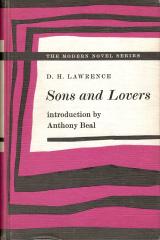David Herbert Lawrence
David Herbert Lawrence (1885.–1930.), engleski književnik, rođen je u rudarskom gradu Eastwoodu, Nottinghamshire. Sin rudara i učiteljice, odrastao je u siromašnim uvjetima, što je oblikovalo njegove teme o klasnim razlikama, prirodi i seksualnosti. Školovao se na Nottingham High Schoolu i University Collegeu u Nottinghamu, gdje je stekao učiteljski certifikat. Počeo je pisati rano, pod utjecajem majke i prijateljice Jessie Chambers. Godine 1911. objavio je prvi roman, The White Peacock, a 1913. Sons and Lovers, poluautobiografsko djelo o odnosu s majkom i sukobima u rudarskoj zajednici.
Njegovi romani The Rainbow (1915.) i Women in Love (1920.) izazvali su kontroverze zbog eksplicitnog prikaza seksualnosti, a Lady Chatterley’s Lover (1928.) bila je zabranjena zbog erotskog sadržaja. Lawrence je istraživao teme modernizma, otuđenja i instinkta, često kritizirajući industrijalizaciju. Pored romana, pisao je poeziju (Love Poems, 1913.), kratke priče (The Prussian Officer, 1914.), eseje (Studies in Classic American Literature, 1923.) i putopise (Twilight in Italy, 1916.).
Zbog zdravstvenih problema (tuberkuloza) i sukoba s cenzurama, proveo je život u egzilu s suprugom Friedom Weekley, putujući Europom, Amerikom i Australijom. Umro je 1930. u Venceu, Francuska. Danas se smatra jednim od ključnih modernističkih pisaca 20. stoljeća, cijenjen zbog dubokih uvida u ljudske odnose i prirodu.
Titles in our offer
Sons and Lovers
Sinovi i ljubavnici je roman D. H. Lawrencea iz 1913. godine. Iako je roman u početku dobio mlak prijem kritike, danas ga mnogi kritičari smatraju remek-djelom i često se smatra Lawrenceovim najboljim ostvarenjem.
